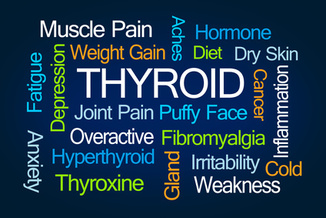Let’s look at what your doctor might be missing.
There are two main thyroid hormones — T4 (levothyroxine) and T3 (triiodothyronine). 90% of the hormone in the blood is T4 and 10% is in the form of T3. T3 is much more powerful than T4 but only lasts in the blood for a few hours. T4 is weaker and can hang around for weeks. T4 is also considered a prohormone and must be turned into T3 to function fully, and is identified as the active form of the hormone. The enzyme deiodinase makes the change and because it is such a large enzyme, individuals can inherit different versions. Deiodinase works fine for some people but not so well in others.
Thyroid hormone regulates energy, body temperature and the rate the body burns food into fuel. In the past, thyroid levels were very hard to measure because they are found in small amounts in the blood. Doctors used to measure resting oxygen consumption in a difficult, laborious test known as BMR (basal metabolic rate).
In the 1960s, measuring total thyroid hormone levels was possible but not precise. By the early 1970s, TSH was added. The pituitary gland evaluates thyroid hormone levels in the blood and sends a signal to the thyroid gland to make hormones. The TSH coming from the pituitary gland in the brain regulates how much thyroid hormone is produced. TSH is the most common thyroid test done in the U.S. and many doctors only use a TSH test to determine how the thyroid gland is doing or if thyroid replacement therapy is adequate.
Most of the thyroid hormone in the blood is carried on a protein called Thyroid Binding Globulin (TBG). Levels of TBG can be measured and can vary a lot, and is affected by liver function and the effects of other hormones such as estrogen. The portion of thyroid hormone not attached to TBG is called Free Thyroid. Total T4 and Total T3 can now be measured as well as Free T4 and Free T3. Despite the advances in laboratory testing, many doctors still measure only TSH. Some may measure TSH and Free T4.
Bodies are complex and problems and variations can occur at many points in the thyroid system. Problems can arise in the pituitary measurements, which throws off TSH. Lack of iodine can cause thyroid production problems. There may be normal amounts of T4 but poor conversion of T4 to T3 because of a variant form of deiodinase or a lack of dietary selenium, which is required as a catalyst. Changes in levels of TBG can affect the relationship between Total and Free Thyroid levels.
Take Home Message:
At Georgia Hormones, we not only measure all parts of thyroid performance but we also look at adrenal hormones and sex hormones which can also affect thyroid function. One or two tests simply don't tell the whole story. Sometimes the laboratory makes mistakes. An incorrect lab test becomes obvious when it is telling a different story from the rest of the set. Just getting one or two thyroid tests can result in false conclusions and incorrect therapy. That is why we do a full evaluation of all of the major hormones. We are looking for balance and health, not just a single prescription. If all you have is a hammer, everything looks like a nail. Simply measuring TSH and prescribing only T4 (levothyroxine) may be OK for many people but may not be adequate for those who don’t exactly “fit the mold.”
Bioidentical T4 and T3 are available at any drugstore as well as freeze dried pork thyroid, which contains both T4 and T3. If needed, compounding pharmacies can make special combinations.

 RSS Feed
RSS Feed